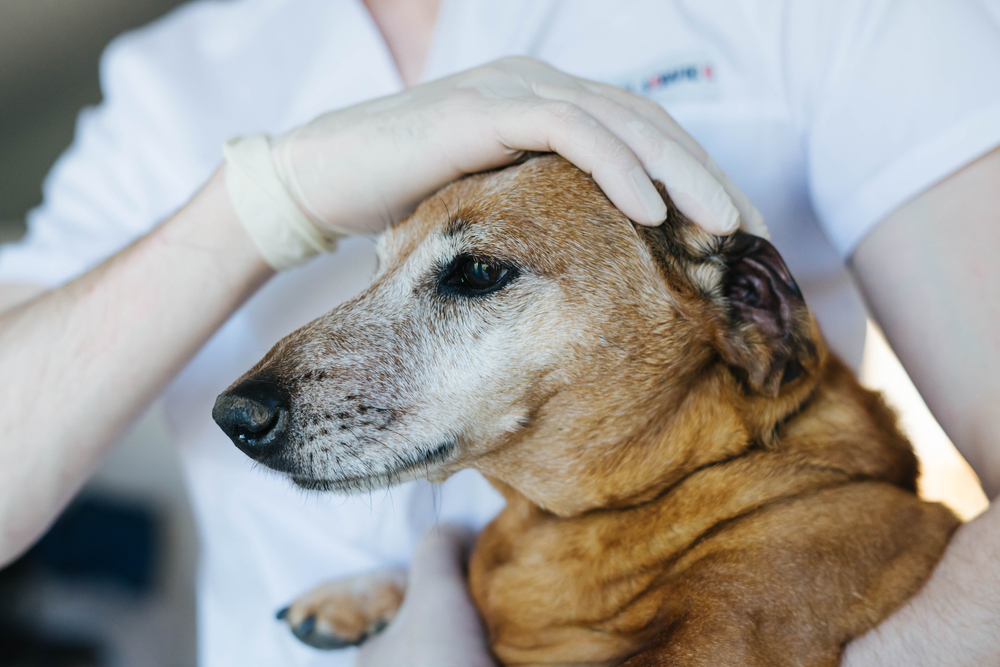Senior Dog Nutrition: How to Feed Your Senior

According to pet health researchers, today’s canines are living longer than ever before. One study clocks the average life expectancy of US dogs at 11.8 years and estimates that dog lifespans have doubled over the past four decades.
That’s great news for dog lovers — more time to spend with our favorite canines. However, it does raise important questions about how to keep senior dogs healthy so they can enjoy their longer lives. And questions about senior dog nutrition are often at the top of the list.
Senior Dog Nutrition: Why It’s Important
As dogs age, it’s normal for their bodies to undergo a variety of changes. These can range from gradual changes in appearance and mobility to developing certain age-related health conditions or diseases, like dental disease and arthritis.
However, just because these changes are typical in senior dogs doesn’t always mean that there’s nothing you can do about it. In many cases, nutrition plays a key role in addressing your aging canine’s changing needs. Sometimes, it can even help treat or prevent certain health issues common in senior dogs.
This is why it’s so important to re-evaluate your senior dog’s diet as they start getting up in years. However, knowing when and how to change your dog’s diet isn’t always obvious.
Should You Change Your Senior Dog’s Diet?

Does your dog still act like a puppy at heart? Is their muzzle looking a lot whiter than it used to? Unfortunately, if you’re looking for a sure sign that your dog is ready for a senior diet, casual observations won’t cut it. Just like humans, some dogs look and act older or younger than their years.
Even going by your pup’s exact age may be somewhat confusing. While most dogs are considered senior after the age of 7, smaller breed dogs may not show signs of aging until they are 8-10 years old. And large or giant breed dogs may start to show signs as early as 5 years old.
All dogs can age differently, even dogs of the same breed. That’s why it’s best to talk to your veterinarian about your pup’s changing nutritional needs and whether it’s time to consider switching to a senior dog food.
Depending on your dog’s overall health, your veterinarian might tell you to stick with the food you’ve been feeding your pet for years…no matter how many birthdays your dog has racked up.
“There is no true reason to feed a senior diet to our aging dog unless there are noted problems, such as lean body wasting, arthritis or obesity,” says veterinarian Dr. Joseph J. Wakshlag, DVM, PhD.
“These conditions all require different approaches to nutrition,” Wakshlag adds. “There is no one-size-fits-all for senior dogs, making this something to discuss with your veterinarian. It can be complex.”
Talking to Your Vet About Senior Dog Nutrition
Though the topic of nutrition for aging dogs can feel overwhelming, talking with your veterinarian about it can make it a lot easier.
In most cases, your veterinarian will suggest a change to your senior dog’s diet during a regular checkup, if they determine it’s time. That decision is based on a variety of factors, including your dog’s age, overall health, and any diagnosed conditions.

But there’s no need to wait for your vet to start the conversation. Certain changes in the health or behavior of an aging dog could signal it’s time to consider a senior diet. These include:
- Changes in appetite
- Loss of muscle mass
- Weight fluctuations
- Dry, dull skin and coat
- Stool changes, such as diarrhea or constipation
- Reduced mobility
These could also be signs of other health concerning age-related health conditions. If you notice any of these signs, contact your veterinarian to determine the cause and ask whether a change in nutrition could be in order.
What to Feed Your Senior Dog

When a veterinarian agrees that it’s time for a dog to switch to a senior diet, some well-intentioned pet parents may think any diet labeled “senior dog food” will do. However, this is primarily a marketing term that doesn’t consider a dog’s individual nutritional needs.
The Association of American Feed Control Officials (AAFCO), which sets nutritional standards for all pet foods, does not provide a different set of nutritional standards for senior dogs. So any adult dog food could be labeled “senior dog food” with no indication of how it’s different or better for elderly canines.
It’s always a good idea to consult your veterinarian before switching dog foods, but it’s especially important when it comes to choosing a diet for your aging dog. A veterinarian can point you in the right direction, based on what nutrition will best address your senior dog’s specific health conditions or concerns.
Depending on your dog’s overall health and needs, here’s what your veterinarian might recommend.
Prescription Diets

If your senior dog has been diagnosed with certain conditions, your veterinarian may recommend a prescription diet. Also called therapeutic diets, these specialized formulas are carefully calibrated to address the unique dietary needs associated with certain health issues and diseases.
For example, dogs with renal disease require a diet that has limited phosphorus, protein, and sodium. Dogs with arthritis can benefit from a diet fortified with added omega-3 fatty acids and glucosamine.
Prescription diets may be an essential part of a larger treatment plan, or they may simply help manage certain symptoms. For example, a senior dog on a prescription diet for arthritis might not have to rely as heavily on NSAID medications to manage pain, which could reduce the risk of liver and kidney damage.
Prescription diets require authorization from your veterinarian before you can purchase them.
Commercial Diets

If your veterinarian does not recommend a prescription diet, there are countless commercial dog food options to consider for your senior dog. So many, it might feel overwhelming.
To help narrow down your choices, it’s worth asking your veterinarian whether there are certain things you should look for in dog food to ensure it fits any existing health or nutritional needs your dog may have. For example:
- Reduced calorie formulas help combat obesity or compensate for decreased activity levels and slower metabolism in older dogs.
- Protein-rich formulas promote healthy muscles and help elderly dogs maintain mobility.
- High-fiber formulas can help alleviate age-related gastrointestinal issues, such as constipation and diarrhea.
- Highly palatable formulas made with higher fat content may help encourage senior dogs who are sick or have reduced appetite to stay well-nourished and strong.
- Wet or moist formulas that contain more water can help older dogs stay hydrated, they may also be more enticing to dogs with reduced appetite and easier for dogs with dental disease to chew.
In addition to addressing your older dog’s unique health needs, all senior dog nutrition diets should:
- Meet AAFCO nutrient profile standards for all life stages or adult dog maintenance. This ensures the diet provides the complete and balanced nutrition adult (and senior) dogs need to thrive.
- Feature quality ingredients rich in protein, vitamins, minerals, and nutrients over inexpensive fillers designed to add calories and bulk.
Supplements

In some cases, your veterinarian may also recommend adding a supplement to your senior dog’s regimen. Nutritional supplements are designed to provide additional nutritional support above and beyond a dog’s existing diet.
For dogs in good health who eat a complete and balanced diet, supplements are not a necessity. However, supplements can play an important role in helping address some senior dog nutrition needs.
Two in particular vets often recommend for senior dogs are:
- Glucosamine supplements help fortify cartilage, the spongy material that acts as a cushion between healthy joints. As pets age, they produce less glucosamine, which can cause cartilage to break down. Glucosamine supplements can help prevent or slow that breakdown and reduce the risk of joint pain, inflammation, and arthritis.
- Omega 3 supplements leverage the powers of omega 3 fatty acids or the “good fats” found in ingredients like fish oil and flax seeds. These help boost your aging dog’s immune system and reduce inflammation, so they’re good for achy joints. They also promote healthy skin and coat, plus brain, heart, and cardiac function.
All supplements have the potential for side effects and possible interactions with medications. So be sure to work with your veterinarian to determine which supplements might benefit your senior dog and how much they need before adding supplements to your dog’s diet.
Questions to Ask About Senior Dog Nutrition

Remember, determining your senior dog’s nutritional needs and ideal diet may not be a one-time conversation. As your dog ages, you will likely need to discuss the topic regularly with your veterinarian to ensure you are feeding your elderly dog what they need to thrive.
Here are some additional questions you can ask to stay on the right track:
What Is My Dog’s Ideal Weight?
Maintaining a healthy weight is especially important in your dog’s golden years, as it can reduce the risk of certain age-related conditions, such as diabetes, and alleviate joint pain associated with arthritis.
Talk to your veterinarian to determine your dog’s ideal weight, as well as the amount of calories they should consume daily to achieve it or maintain it. This may change throughout your dog’s senior years, as metabolism decreases with age.
It’s a good idea to weigh your dog regularly to detect weight fluctuations before they lead to health issues. Consider signing up for a GreatPetCare account, to access helpful health management tools, including a handy pet weight tracker.
Can Testing Show What Diet Could Benefit My Senior Dog?
Having your dog’s bloodwork evaluated yearly is critical for monitoring their health as they age. Changes in certain blood values can reveal underlying issues that can often be managed by changing diets. Issues such as kidney disease, diabetes, pancreatitis, and protein-losing enteropathy can all be managed with nutrition.
Certain minerals and electrolytes should be monitored as well. Potassium and phosphorous can be abnormal because of renal disease. These are treated and managed with nutritional intervention. Excess levels of calcium can even be secondary to certain cancers in pets and should be investigated.
Senior Dog Nutrition: Other Tips and Advice

- When beginning your dog on a new food, it will likely take 4-5 days to completely transition them over to the new food. You’ll want to mix their new food in with their old, with the new being 20% of the meal the first day and slowly increase it to the full amount by day 4 or 5.
- Free feeding, or leaving food out all day for your dog, is not a good idea. It’s difficult to know how much they are eating when this is done and often leads to overeating. It’s recommended to feed your dog twice daily.
- Treats can be given to your dog as long as they make up no more than 10% of their daily calories. Treats such as green beans, carrots, and apples are ideal for any dog and don’t add much to the daily calories.
- To encourage your senior dog to eat, try adding water to their kibble or warming it up. By warming it up, the smell is enhanced and can be detected by their diminished sense of smell.
Whether your dog is approaching seniorhood or already well into their golden years, caring for them can be both challenging and rewarding. Work with your veterinarian to understand which diet is the best for your pet. With the proper guidance, choosing the right food to fulfill your dog’s changing nutritional needs can make their final years happy, healthy, and enjoyable for you both.









